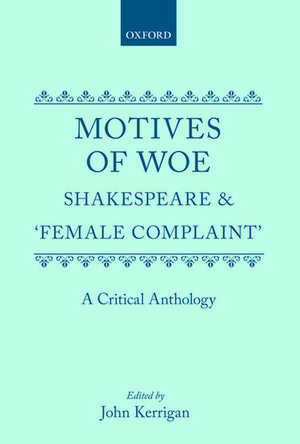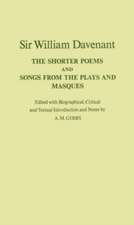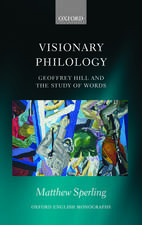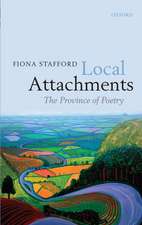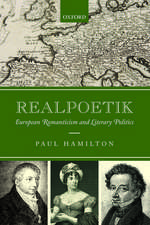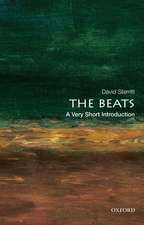Motives of Woe: Shakespeare and `Female Complaint'. A Critical Anthology
Editat de John Kerriganen Limba Engleză Hardback – 26 sep 1991
Preț: 1053.48 lei
Preț vechi: 1600.50 lei
-34% Nou
Puncte Express: 1580
Preț estimativ în valută:
201.65€ • 219.11$ • 169.49£
201.65€ • 219.11$ • 169.49£
Carte tipărită la comandă
Livrare economică 10-16 aprilie
Preluare comenzi: 021 569.72.76
Specificații
ISBN-13: 9780198117704
ISBN-10: 0198117701
Pagini: 324
Ilustrații: 6 woodcuts and engravings
Dimensiuni: 163 x 241 x 23 mm
Greutate: 0.64 kg
Ediția:New.
Editura: Clarendon Press
Colecția Clarendon Press
Locul publicării:Oxford, United Kingdom
ISBN-10: 0198117701
Pagini: 324
Ilustrații: 6 woodcuts and engravings
Dimensiuni: 163 x 241 x 23 mm
Greutate: 0.64 kg
Ediția:New.
Editura: Clarendon Press
Colecția Clarendon Press
Locul publicării:Oxford, United Kingdom
Recenzii
'minutely focused study of Shakespeare and gender-relations ... Kerrigan's anthology makes us look at a variety of texts in a new way, and valuably enhances our sense of Shakespeare's self-consciousness.'Times Literary Supplement
`Although the editor directs the anthology towards the non-specialist reader, both these textual notes and the introduction are of a more scholarly orientation. Nevertheless, the introduction provides an often contentious but detailed account and commentary upon the development of the `female complaint' from classical sources to its eventual demise in the 18thy century. The original nature of this collection of poetry results in its applicability for both teaching and research purposes.'M. Hansen, Studies on Women Abstracts
'Genre-based anthologies ... can be a source of both pleasure and profit, bringing familiar poems into sharper focus and introducing unfamiliar ones. The present anthology of female-voiced complaints admirably meets these expectations. A further reason to welcome the volume is that female complaint is arguably a genre whose time for scrutiny has come.'Anthea Hume, University of Reading, Review of English Studies, Vol. 45, No. 180, Nov '94
'Besides his scrupulous historical perspective, Kerrigan draws on a sophisticated apparatus of modern critical theory ... 'Motives of Woe' is not only a fine, distinguished and intellectually vigorous piece of work, but it is also an innovative study which reaches far beyond the humble, pedestrian task of editing little known texts around a faily neglected theme. In fact this rather low-key type of literary criticism should be praised as it makes its point more surely than many 'high astounding terms' of some critical theorists, all the more so as the points and arguments presented in the both scholarly and brilliant introduction are later ex-emplified in the judicious and highly interesting anthology of texts illustrating the subgenre of 'Female Woe', cleverly tuning our ears to the sad but beautiful and often highly elaborate acoustics of women's complaint throughout the centuries.'Francois Laroque Universite de la Sorbonne Nouvell, Paris III Archiv
`Although the editor directs the anthology towards the non-specialist reader, both these textual notes and the introduction are of a more scholarly orientation. Nevertheless, the introduction provides an often contentious but detailed account and commentary upon the development of the `female complaint' from classical sources to its eventual demise in the 18thy century. The original nature of this collection of poetry results in its applicability for both teaching and research purposes.'M. Hansen, Studies on Women Abstracts
'Genre-based anthologies ... can be a source of both pleasure and profit, bringing familiar poems into sharper focus and introducing unfamiliar ones. The present anthology of female-voiced complaints admirably meets these expectations. A further reason to welcome the volume is that female complaint is arguably a genre whose time for scrutiny has come.'Anthea Hume, University of Reading, Review of English Studies, Vol. 45, No. 180, Nov '94
'Besides his scrupulous historical perspective, Kerrigan draws on a sophisticated apparatus of modern critical theory ... 'Motives of Woe' is not only a fine, distinguished and intellectually vigorous piece of work, but it is also an innovative study which reaches far beyond the humble, pedestrian task of editing little known texts around a faily neglected theme. In fact this rather low-key type of literary criticism should be praised as it makes its point more surely than many 'high astounding terms' of some critical theorists, all the more so as the points and arguments presented in the both scholarly and brilliant introduction are later ex-emplified in the judicious and highly interesting anthology of texts illustrating the subgenre of 'Female Woe', cleverly tuning our ears to the sad but beautiful and often highly elaborate acoustics of women's complaint throughout the centuries.'Francois Laroque Universite de la Sorbonne Nouvell, Paris III Archiv
